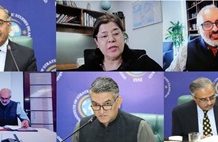Judges must be independent of street pressure as well as demands from other quarters to be able to make impartial decisions. In securing independence of judiciary we must revisit the procedures for appointing justices and ensuring the security of their tenure
There is a consensus in Pakistan, at least on the surface, on judicial independence. Many historians of Paskistan believe that had a different verdict been given nearly half a century back in the Maulvi Tamizuddin case, the political history of the country would have been less troublesome. Equally, they bemoan the invoking and application of the doctrine of necessity by the Supreme Court, which hurt the cause of democracy by legitimising military takeovers.
The recent decision by a full bench of the Supreme Court restoring the chief justice has been celebrated throughout the country as a triumph of justice and a great landmark in the judicial history of the country. People of all classes, regions and religious and political persuasions have rejoiced over the apex court’s turning the corner. It was great news perhaps even the news they have been waiting decades to hear for the people of a country who have become used to bad news.
Why do some consider the verdict truly historic, likely to have far-reaching effects on future political developments in the country? I will emphasise two reasons, primarily to do with the role of the judiciary as a separate and independent institution in a democracy.
The judiciary’s foremost role and the highest in the hierarchy of its responsibilities is guardianship of the constitution. The other two branches of the state, the executive and civil society, have an equal responsibility to respect and honour constitutional norms, but the final institutional authority to determine the constitutionality of the acts of legislature and the executive rests with the Supreme Court.
The power of judicial review, a norm developed by the Supreme Court of the United States and now widely accepted as universal, is a power claimed through interpretation. Being undefined, judicial review gives broad powers to the court to rule over executive and legislative acts when their constitutionality is challenged. The courts in democracies determine what is constitutional and what is not. The objective of this power is to make the legislature and the executive function within the limits of the constitution. There are no other effective checks on them other than the judiciary.
The second most important function of the courts is to hold the political executive accountable. Of all the branches of state, the executive is the most powerful in terms of expanse of jurisdiction. For this reason, its functionaries are more prone to overstepping their authority than other institutions. What pushes them in the direction of arbitrariness is the political compulsion to deal out patronage, do things for their political supporters, constituents, and in a family-oriented society like Pakistan, close relatives and cronies. In such societies, the boundaries between patronage and corruption often become too thin to distinguish what is legally right or wrong.
In democracies, nobody can take refuge in popular support for legal wrongs. It is an absurd argument that a politician has done no wrong if he or she has been re-elected in the face of serious allegations about his or her conduct while in office. Political thinkers have wrestled for centuries with the problem of criminals getting elected to legislatures. The answer to this dilemma is in judicial accountability, of both the permanent administration and the political executive.
How then to achieve the larger social goal of an independent judiciary that deals with the executive, which after all selects the judges that sit in the Supreme Courts, without fear or obligation? This power in the United States is shared by the president and the Senate, which closely examines the character, legal experience, judicial philosophy and ideological leanings of the judicial nominees of the president. Public hearings and cross examination of the candidates before live cameras are held, necessarily involving public opinion, before a nominee is rejected or confirmed. Quite often presidents have withdrawn nominations or nominees voluntarily bowed out of the process in the face of public criticism. In a supreme court with only nine judges on the bench, the system of appointment of justices has to be rigorous, and also because judges can be removed only through a process of impeachment by the Senate and not by the president of the United States.
Life tenure for judges is the best guarantee of their freedom from the executive once they take an oath of office. Our own Constitution, and now quite a few judicial precedents, provide for that, but by using the device of the provisional constitutional order, our military rulers have subverted it. This disfiguration amounting to a new constitution, written and enforced by one man, required the judges to take a new oath of office.
Decades of debate among democratic forces in Pakistan have failed adequately to reflect on how the judiciary can be made an independent institution, free of the intimidation and influence of the executive branch. The pressure in the street exerted by civil society and lawyers parallel to the CJ case hearing, though laudable, is not adequate, nor is it an accepted political norm. Judges have to be independent of street pressure as well as strains or demands from other quarters to be able to make impartial decisions.
In securing independence of judiciary we must revisit the procedures for appointing justices and ensuring the security of their tenure. Most remarkably, the court ruled that judges cannot be made dysfunctional by an executive order. Doing this was a major flaw in the reference filed against the chief justice.
We need to rethink the Supreme Judicial Council as the ultimate body to determine instances of misconduct in the judges of superior courts. As a check on the Council, judges subjected to scrutiny may have the right of appeal to the Supreme Court.
The Senate of Pakistan may share the power to appoint justices, and form a judicial committee with proportionate representation of all the political parties to do this. Executives all over the world have a tendency to pack the courts with their favourites for political or ideological reasons. The decision in the judges’ case may not be adequate guarantee against this. Why not think of legislative scrutiny of the candidates and public hearings of the nominees, and why not stop appointment of ad hoc judges to the high courts?
We need serious and sincere debate on these fundamental issues of institutionalising independence of judiciary, to fence it from the domination of the executive and the street.
The author is a professor of Political Science at the Lahore University of Management Sciences.












